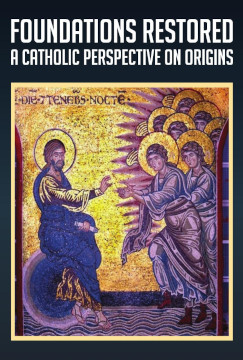- Welcome to St. Isidore forum.
Recent posts
#21
Fides et Ratio / Stanley Jaki International Con...
Last post by Geremia - April 30, 2024, 03:03:10 PMStanley Jaki International Congress
Wednesday, April 24, 2024
Videos that mention ecclesiology, Thomism (Garrigou-Lagrange), or Duhem:
Wednesday, April 24, 2024
Videos that mention ecclesiology, Thomism (Garrigou-Lagrange), or Duhem:
- 01:08:51-01:40:18 "Jaki and Barbour: Pilgrims on Parallel Paths of the Science and Religion Journey" - Rev. Joseph R. Laracy, S.T.D.
- 04:58:18-05:25:53 "Theology as a Science and the Dialogue with Other Sciences from a Thomistic Perspective"- Rev. João Paulo Santiago, C.S.J.
- 05:57:45-06:27:50 "Stanley Jaki: A Life Devoted to the Relationship Between Science and Faith" - Antonio Colombo, M.S.
- 07:27:30-07:59:48 "All Things were Made through Him: Some Thoughts about The Teaching of St. Thomas Aquinas on the Relationship between Matter and God" - Jordan Miller, Ph.D.
#22
General Discussion / Re: felix festum Seraphicæ Vir...
Last post by Geremia - April 30, 2024, 01:39:41 PMShe's the great patroness of traditional Catholics!
She and her spiritual director, Bl. Raymond of Capua (Dominican master general), founded the Dominican Observant Reform Movement, which St. Vincent, fra' Girolamo Savonarola, et al. continued.
Her canonization was pivotal for ending the Great Western Papal "Schism".
Oret pro nobis!
She and her spiritual director, Bl. Raymond of Capua (Dominican master general), founded the Dominican Observant Reform Movement, which St. Vincent, fra' Girolamo Savonarola, et al. continued.
Her canonization was pivotal for ending the Great Western Papal "Schism".
Oret pro nobis!
#23
Catholic Resources / Re: Writings of the saints and...
Last post by kerrysky - April 23, 2024, 09:18:59 PMBook of the day (Wednesday, 24th of April 2024)
St Padre Pio - Heavenly Facts and Words of Wisdom
https://disk.yandex.com/i/-mKywWgRyjZH7w
written by Giuseppe Caccioppoli who also wrote Extensive Padre Pio Website on https://caccioppoli.com/
Source: https://freecatholicebooks.wordpress.com/
St Padre Pio - Heavenly Facts and Words of Wisdom
https://disk.yandex.com/i/-mKywWgRyjZH7w
written by Giuseppe Caccioppoli who also wrote Extensive Padre Pio Website on https://caccioppoli.com/

Source: https://freecatholicebooks.wordpress.com/
#24
Philosophy / Re: Declaration of Independenc...
Last post by Geremia - April 20, 2024, 02:48:28 PMQuote from: Geremia on October 17, 2016, 09:00:53 AMthe more opposing "factions," the more balanced ("just") the country will be.The more decentralized the opposing factions are, the better, it seems.
#25
Forum-Related / Re: St. Isidore e-book library...
Last post by Geremia - April 20, 2024, 02:41:26 PMI've disabled it for now. IPFS uses too much bandwidth. ☹
#26
Theology / Catholic Teaching on IVF - Que...
Last post by Geremia - April 14, 2024, 04:33:18 PM #27
General Discussion / Randall Terry's completed ads ...
Last post by Geremia - April 03, 2024, 01:36:09 PM- Judgement
- Beautiful people
- The Devil Went Down to Democrats
- Joe Biden Enemy Of Children
- Abortion Is Worse Than Slavery
- 13 AD #1 Final Cut Export
- 8 AD #2 The Black Community is Bamboozled Final Cut
- 10 AD #3 Biden, Kamala, and the KKK Final Cut
- 10 Abortion is Worse than Slavery Final Cut
- 14 AD #1 Black Leaders Sold Us Out Final Cut Export Copy 01
source: Terry2024.com
#28
Catholic Resources / Re: Writings of the saints and...
Last post by Geremia - March 20, 2024, 10:57:05 AMThank you.
Quote from: kerrysky on March 20, 2024, 06:00:31 AMThe Incorruptibles by Joan Carroll Cruzis in the e-book library already.
#29
Catholic Resources / Re: Writings of the saints and...
Last post by kerrysky - March 20, 2024, 06:00:31 AMQuote from: Geremia on March 04, 2024, 04:37:32 PMThank you. This one is not already in the e-book library:The Author is Giuseppe Caccioppoli who also wrote Extensive Padre Pio Website on https://caccioppoli.com/Quote from: kerrysky on March 02, 2024, 11:41:14 PMSt Padre Pio - Timeline, Words, FactsWho is the author?
https://disk.yandex.com/i/UE-8cti-UeKr9g

I just uploaded some of my favorite books on archive.org under the name kerrysky, you might take a look and download the books here:
https://archive.org/details/@kerrysky
Some of the Featured Books
No Greater Love by Mother Teresa
https://archive.org/details/no-greater-love-mother-teresa
Pray, Hope, and Don't Worry - True Stories of Padre Pio by Diane Allen
https://archive.org/details/pray-hope-and-dont-worry-true-stories-of-padre-pio-1
The Incorruptibles by Joan Carroll Cruz
https://archive.org/details/the-incorruptibles-cruz-joan-carroll-5859-1
Miracles of the Church Collection - With Photos
https://archive.org/details/miracles-of-the-church-collection-with-photos
I hope you like them

You can also do a search on archive.org for books of a particular saint such as St Augustine of Hippo and they will come up, I get most of my books from there.
#30
General Discussion / Happy feast of St. Joseph! 🥳 🎉
Last post by Geremia - March 19, 2024, 02:40:08 PMPope St. Pius X (Giuseppe Sarto)'s prayer to San Giuseppe (Oct. 1906, ASS 40 (1906) 59, Raccolta #439):
Quote from: Pope St. Pius XO Ioseph, virgo Pater Iesu, purissime Sponse Virginis Mariæ, quotidie deprecare pro nobis ipsum Iesum Filium Dei, ut, armis suæ gratiæ muniti, legitime certantes in vita, ab eodem coronemur in morte.
Quote from: Pope St. Pius XO Joseph, virgin-father of Jesus, most pure Spouse of the Virgin Mary, pray every day for us to the same Jesus, the Son of God, that we, being defended by the power of His grace and striving dutifully in life, may be crowned by Him at the hour of death.






